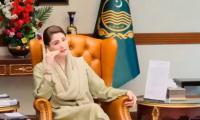NEW DELHI/BEIJING/ISLAMABAD: A week before the US presidential election, US Secretary of State Mike Pompeo signed a military agreement Tuesday before heading to Sri Lanka on a multicountry tour aimed at pushing the Trump administration’s anti-China message.
Pompeo was joined in New Delhi by US Defense Secretary Mark Esper. Together, they signed a pact with their Indian counterparts to share sensitive satellite data, often used to steer missiles and drones, reports the international media.
It’s the latest in a series of US-India military agreements designed to counter China’s growing power in the Indo-Pacific region. "Big things are happening as our democracies align to better protect the citizens of our two countries and indeed, of the free world," Pompeo said at a news conference held outdoors amid the pandemic. Participants removed their masks only when speaking into their microphones.
Earlier, Pompeo and Esper met with Indian Prime Minister Narendra Modi. They discussed "COVID-19 response, security and defense cooperation, and shared interests in a free and open Indo-Pacific," according to a statement from the US State Department.
Tuesday's visit comes during a spike in tensions between India and China. The two countries share the world's longest unmarked border, stretching more than 2,000 miles and with much of it high in the Himalayas.
Violence broke out between rival troops there this summer. In June, 20 Indian troops were killed in hand-to-hand combat with Chinese soldiers. Pompeo and Esper laid wreaths at a war memorial in New Delhi early Tuesday.
Military buglers played as Pompeo put his hand on his heart. Afterward, he said he was thinking of those 20 Indian troops killed this summer. And he railed against the Chinese Communist Party, or CCP.
"The CCP is no friend to democracy, the rule of law, transparency, nor to freedom of navigation — the foundation of a free and open and prosperous Indo-Pacific," Pompeo said.
However, there was an awkward moment at Tuesday's news conference when Indian Defense Minister Rajnath Singh was asked whether he's willing to stop buying Russian weapons. For decades, the Soviet Union and later Russia were India's biggest arms suppliers.
"Decisions happen on the basis of negotiations," Singh demurred. "Whomever we buy from, or not buy from, depends on negotiations." Despite Pompeo's strong anti-China rhetoric, neither Singh nor Minister of External Affairs Subrahmanyam Jaishankar mentioned China by name at their joint news conference with the US officials.
But the timing of their summit hosting Pompeo and Esper was clear, amid tensions with China after summertime border skirmishes, says Tanvi Madan, a senior fellow at the Brookings Institution in Washington DC.
"I think it's significant that [Pompeo and Esper's visit] is happening even as India is involved in a boundary crisis with China. India might have declined to do a high-profile visit like this with American officials, in case China was provoked further," Madan says. "So it says something about the U.S.-India relationship."
Pompeo departed Delhi and landed Tuesday evening in Colombo, Sri Lanka's capital, where the main topic of his discussions with local officials Wednesday (today) will also likely be China. He also plans to visit the Maldives and Indonesia before returning to Washington, D.C.
Sri Lanka and the Maldives are deep in Chinese debt, which their governments have used to finance big infrastructure projects. The Chinese Embassy in Sri Lanka denounced Pompeo's visit to the island even before he arrived.
China dismissed Pompeo’s accusations. “We urge Pompeo to abandon his Cold War mentality, zero-sum mindset, and stop harping on the ‘China threat’,” Chinese Foreign Ministry spokesman Wang Wenbin told a news briefing in Beijing earlier on Tuesday.
Commenting on the signing of US-India Basic Exchange and Cooperation Agreement (BECA) on sharing of geospatial information, Pakistan Tuesday said it had been consistently highlighting the threats posed to strategic stability in South Asia as a result of provision of advanced military hardware, technologies and knowledge to India.
Commenting on the development, the Foreign Office of Pakistan said India’s massive acquisition of armament and expansion of its nuclear forces, including introduction of new destabilizing weapon systems, were developments with serious repercussions for peace and stability in South Asia.
“The recent unprecedented rate of missile tests conducted by India is yet another manifestation of dangerous Indian conventional and nuclear military build-ups, said spokesman Zahid Hafiz Chaudhri.
“This again corroborates concerns expressed by several international experts on the military spin-offs of conducting high technology trade with India, which has not only eroded the international norms, but has also resulted in negatively affecting the strategic stability in South Asia. These developments clearly negate the argument that India’s mainstreaming in the international export control regimes will further the non-proliferation objectives of these regimes,” the spokesman added.
||
The government has returned the services of BS-20 officer of Information Service Shafqat Abbas to the Ministry of...
Previously, the prime minister had given four days to the committee to fix responsibily for the import of wheat
The petitioner stated that the electoral body had no authority to interpret the constitution
CM was briefed that in first phase, 12 schools for special children would be completely revamped this year
Anti-Corruption Establishment filed appeals against 58 sentences handed down by the courts from January 1, 2018 to...
These statistics reflect that on an average, 700,000 youngsters add up to the total number of out-of-school children...







